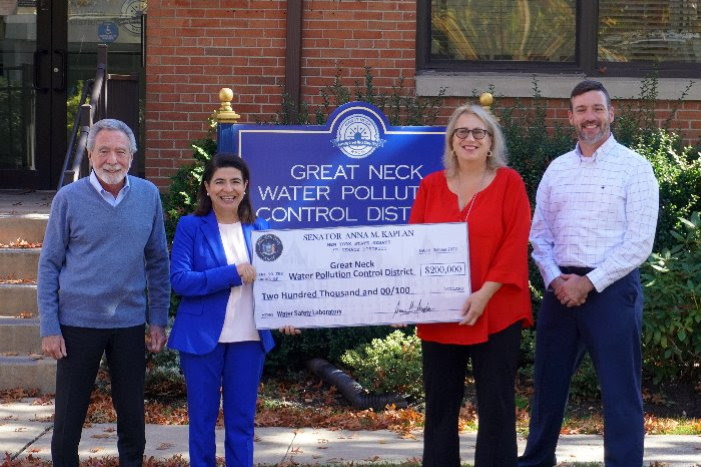$200,000 grant will provide state-of-the-art laboratory equipment that will improve wastewater treatment, better protect the environment, allow for more on-site public health data sampling, and reduce costs at the public utility
The facility has taken on an outsized role in protecting public health during the pandemic era due to its role in wastewater surveillance for the spread of COVID-19 and, more recently, Polio.

CARLE PLACE, NY (October 30, 2022) – Today, New York State Senator Anna M. Kaplan (D-Port Washington) delivered a $200,000 grant to the Great Neck Water Pollution Control District (GNWPCD) that will fund significant upgrades to the environmental laboratory at GNWPCD’s wastewater treatment plant on East Shore Road in Great Neck. The grant will provide state-of-the-art laboratory equipment that will improve wastewater treatment, better protect the environment, allow for more on-site public health data sampling, and reduce costs at the public utility. Facilities such as this have taken on an even greater role in protecting public health during the pandemic era as a they allow for wastewater surveillance that tracks the spread of COVID-19 and, more recently, Polio.
Senator Anna M. Kaplan said “the work being done at GNWPCD’s environmental laboratory is vital to protecting our public health and our environment. By upgrading this important facility with the latest technology, we can better protect our bays and our groundwater, and we can deliver more efficient and cost-effective service for taxpayers. I’m proud to be able to support this important project by delivering the funding that will get it built.”
Patty Katz, Chairwoman, GNWPCD, said “We appreciate the time and effort Senator Kaplan has spent for our District in obtaining this grant. The laboratory upgrades it will provide will help us to continue to protect our environment and further optimize our treatment efficiency.”
The GNWPCD’s wastewater treatment plant is designed to treat a daily flow of 5.3 million gallons per day. Sewage is transported to the plant via 72 miles of sanitary sewers with the assistance of 10 remote pumping stations.
The current environmental laboratory has been in service for more than 15 years, residing in a repurposed onsite pump building. As currently configured, there is a limited amount of onsite testing that can be performed due to lack of equipment and layout available.
The upgraded environmental laboratory being funded by Senator Kaplan’s grant will allow GNWPCD to perform many of the tests that it currently contracts outside laboratories to perform. Along with the savings this onsite testing will yield, it will also allow the facility operators to obtain up-to-the-minute results, instead of waiting days or weeks. Having this information immediately will result in better treatment, more efficient decision-making and control of the facility, and further savings in utility costs.
In the pandemic era, laboratories such as this have taken on an even greater role in protecting public health by facilitating wastewater surveillance to track the spread of COVID-19, and more recently in New York, Polio. Wastewater surveillance is done by collecting wastewater samples to measure the amount of the virus in the sample. COVID-19 can be detected in wastewater as many as three to seven days before increases are seen in the percentage of people who test positive or are hospitalized. It has become very useful for predicting a rise in COVID-19 cases within a community, and more recently, it has helped public health officials track the alarming spread of the Polio virus.
Several counties across New York are exploring using wastewater surveillance to track opioids and their metabolites, antimicrobial resistant pathogens, influenza, RSV, Hepatitis A, and Hepatitis E. Such testing could one day be facilitated by the new environmental laboratory in Great Neck once constructed.
About the GNWPCD: The Great Neck Water Pollution Control District (GNWPCD) is a special commissioner-run district within the Town of North Hempstead. The GNWPCD has provided sewage services for the Great Neck area since 1914, and currently serves more than 25,000 residents and businesses in the villages of Great Neck, Saddle Rock, Kensington, and those parts of Thomaston and Great Neck Plaza east of Middle Neck Road; as well as unincorporated areas north of the Long Island Railroad and a part of Manhasset. The GNWPCD’s mission is to protect human health, our bays and the environment.





